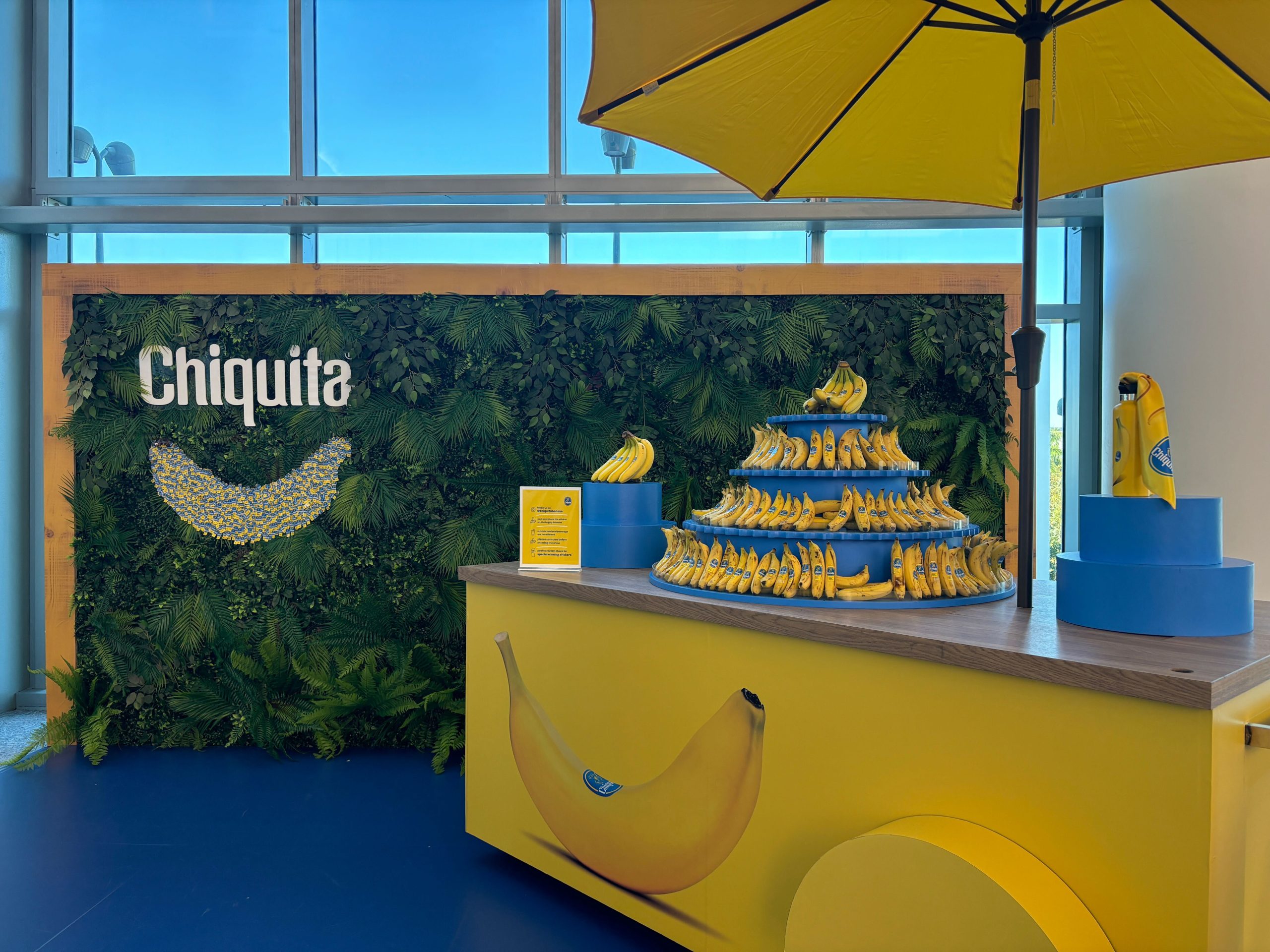On November 25, the banana brand Chiquita lit up Instagram with eye-catching yellow stories, offering a chance to win free tickets to Art Basel Miami Beach. The deal was simple: share your email address for a shot at a pair of one-day passes. The next day, the company posted a banana adorned with stickers reading “Proud Partner of Art Basel Miami Beach.” As the authors of Banana Craze, an award-winning digital humanities project on the banana monoculture in contemporary Latin American art, we were stunned. Chiquita’s raffle felt like a gimmick — a cruel joke.
Chiquita Brands International, formerly the United Fruit Company, is the company behind numerous cases of labor rights abuses, environmental degradation, and the overthrow of democratic governments in Latin America since the beginning of the 20th century. As scholars of contemporary Latin American art and bananas, we feel compelled to address the irony of Chiquita supporting a fair so deeply rooted in Latin American art — from its location in Miami to its many Latin American galleries, collectors, and artists.
Just a few months ago, Chiquita was found liable in a civil case of the Federal United States District Court of the Southern District of Florida for financing paramilitary killings in Colombia between 1997 and 2004, and the judge ordered the company to pay $38.3 million to the victims’ families. The company, credited by some for shaping the 20th-century model of multinational corporations and for pioneering modern marketing and public relations, earned the nickname “El Pulpo” (“The Octopus”) for the controversial extent of its power, especially in Central America and the Caribbean. Throughout the last century, the banana company was behind a long list of violent incidents, including the infamous 1928 Banana Massacre in Colombia and the 1954 coup d’état against then-President Jacobo Árbenz in Guatemala. Chiquita’s art-washing as an official sponsor of Art Basel Miami Beach is therefore so appalling that it turns the stomach.


Listed in the art fair’s website list of official partners, Chiquita’s sponsorship promises to bring “light spirited fun and good nutrition to the fair,” according to artnet. And that’s to celebrate the “longstanding connection between bananas and the art world,” the company told the Art Newspaper. (Though still listed as an “official partner,” Chiquita’s dedicated page on Art Basel Miami Beach’s website has been removed in recent days. In response to our inquiry, a spokesperson for the fair said the decision was “taken in conjunction with Chiquita to limit promotion of the activation on Art Basel’s website due to high onsite demand”.)
One Chiquita Instagram ad even features a duct-taped banana, calling it “iconic, with a touch of tape.” So here we are again — just two weeks after Sotheby’s multimillion-dollar sale of Maurizio Cattelan’s “Comedian” (2019), the spotlight is back on a White, European artist. But what about the hundreds of Latin American artists who are actually using banana imagery to confront Chiquita’s colonial abuses?

Often referred to as the “capital of Latin America,” Miami has been home to wealthy personalities from the Spanish-speaking Americas for decades, especially figures from the music, film, and art industries. In the field of contemporary art, this bridge between the United States and Latin America was consolidated with the opening of the Pérez Art Museum of Miami in 1984. As we recently explained in our opinion column for the Colombian digital media outlet La Silla Vacía, the presence of artists, galleries, collectors, and dealers of contemporary art at Art Basel Miami Beach has only continued to grow. In this December’s edition, two-thirds of the galleries come “from the Americas,” with the fair being described as “the leading global platform for the discovery” of art from Latin American countries.
Given the fair’s strong Latin American character, Art Basel Miami Beach deserves more than Chiquita’s multinational branding. Instead, it should spotlight the powerful legacy of Latinx and Latin American art that openly condemns the company’s practices. Is Art Basel Miami Beach aware of Luis Camnitzer’s hilarious 2016 Change.org campaign to change the name of the Republican Party to the “Banana Republican Party” following the election of Donald Trump as President of the United States? Does Chiquita know of Rachelle Mozman Solano’s fantastical video in which the founder of the United Fruit Company, Minor Cooper Keith, is infected with Panama disease, as is the banana monoculture worldwide? Have the fair organizers seen the 2008 May Day series by Andrea Chung, who currently has a solo show at the Museum of Contemporary Art North Miami, in which she erases farmers from vintage plantation photographs to give them a day off? Is anyone familiar with Nicolás Dumit Estévez’s brilliant, queer Latinx impersonation of “Chiquito Banano“? Shouldn’t the map of Miami be redesigned as a banana, as in Dominican York artist Yunior Chiqui Mendonza’s poignant “Bananhattan,” recasting New York City in the fruit’s image?

Chiquita has long profited at the expense of Latin American people, and now it’s profiting again by promoting its brand at a major art fair with deep ties to the region. This is unacceptable — a company with blood on its hands has no place in the arts, let alone brazenly associating itself with Latin American culture. Here are three ways to respond to Chiquita’s photocalls, merchandising, and banana sampling carts if you’re planning to attend the 2024 edition of Art Basel Miami Beach: Focus on the Latinx and Latin American artists and galleries at the fair; choose fair trade bananas if you’re in the mood for a snack; and protest creatively. Take inspiration from artists like Karlo Andrei Ibarra, Jean-François Boclé, and Tonico Lemos Auad by carving your message into banana peels.

